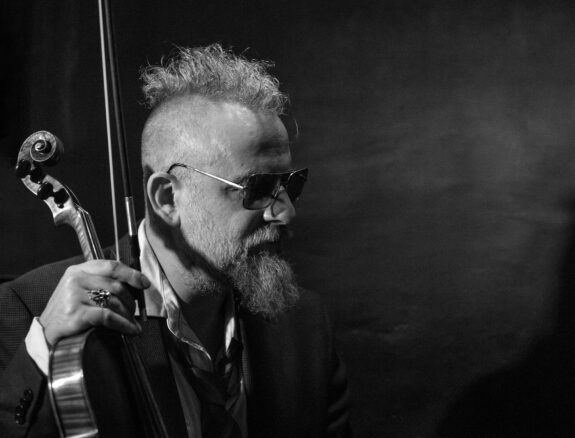
Matana Roberts is an internationally celebrated composer, performer, band leader, saxophonist, sound experimentalist, and mixed-media practitioner.
Working across many contexts and mediums, including improvisation, music composition, visual art, dance, poetry, and theatre, Roberts is perhaps best known for their acclaimed Coin Coin project – a multi-chapter work of ‘panoramic sound quilting’ mixed media performance work, that aims to expose the mystical roots and intuitive traditions of American creative expression, while maintaining a deep and substantive engagement with narrative, history, community and political expression within sonic structures.
The ongoing twelve-part Coin Coin series began with Coin Coin Chapter One: Gens de couleur libres (2011), which was named “one of the most conceptually ambitious, sonically captivating, emotionally raw musical odysseys of the decade..” by Tiny Mixtapes, whilst The Wire deemed Matana “a major talent”. SPIN Magazine described this first chapter as “Deeply spiritual, sadistically dissonant, evocative as any novel.” The album’s story begins the Coin Coin cycle in 1742, the birth year of freed slave entrepreneur Marie Therese Metoyer, whose nickname, “Coin Coin” (also a nickname given to Matana by their grandfather) gives us the title of what NPR called “consistently rewarding music”.
Coin Coin Chapter Two: Mississippi Moonchile is woven together from verbatim conversations Matana had with their grandmother. It features the talents of tenor Jeremiah Abiah, pianist Shoko Nagai, trumpeter Jason Palmer, double bassist Thomson Kneeland, and drummer Tomas Fujiwara. In the wake of its release, Pitchfork deemed Matana “one of the most exciting new spirits in contemporary music,” and LA Times called Matana, “a unique, shape-shifting compositional voice”. Coin Coin Chapter Three: river run thee took a different path, with Roberts electing to perform solo, and making heavy use of electronics for the first time. A Closer Listen called it “a quilt of conviction, a tapestry of interlocking genres and a musical masterpiece,” whilst Pitchfork was enthralled, claiming that “Roberts isn’t just a storyteller, musician, ethnographer, historian, bandleader, arranger, improviser, or activist. [They] play all of those roles, yes; collectively, they power one of the most provocative ongoing bodies of work by any American musician”.
Coin Coin Chapter Four: Memphis was released in 2019, predominantly telling the story of a girl whose parents were killed by the Klu Klux Klan. NPR summed up Matana as a “multidisciplinary visionary”, Stereogum called the album “a staggering work of art,”, and The Quietus concluded that “one can only assume that when the 12-album cycle is completed, it will be regarded as a singular masterpiece of twenty-first century sonic and narrative art.”
With a reputation forged over the last two decades for visceral and galvanising live performance (recognised for example by Brooklyn Rail as a “beautiful and transporting” experience), November 2022 saw Roberts tour Europe presenting Coin Coin Chapter IV: Memphis with a 5-piece group at several prestigious venues including Berliner Festspiele, Banlieu Bleues in Paris, and Milton Court in London – where The Wire described the performance as “like getting a glimpse into another dimension” and “a feat of architecture just as much as songwriting”.
Previous live performances, both ensemble and solo, across the global contemporary music spectrum, have been rapturously received. These include Big Ears in Tennessee, USA, which Rolling Stone described as “a jazz show that felt like a noise show”, a “deeply moving” (The Quietus) performance at Unsound in Krakow, PL, a show at Newport Jazz Festival in Rhode Island, USA which The Boston Globe deemed “soul-baring and participatory”, Donaufestival in Donau, Austria, and Le Guess Who? in Utrecht, NL, where Matana was a guest in 2021.
In recent times they have served as distinguished guest composer at the University Of Chicago, chair of the Music Sound department at Bard MFA, music & sound fellow of the DAAD Artists-in-Berlin programme. New performance works and scores have been commissioned by Donaueschinger Musiktage (DE), Miller Theater’s Composer Portrait series (US), The Crossing (US), Walthamstow Borough Of Culture (UK), Brooklyn Rider (US) and by the composers, Claire Chase, Elaine Mitchener and Johnny Gandelsman, while their mixed-media artworks have been shown across a variety of solo and group contexts including a major residency and solo exhibition at New York’s Whitney Museum, and works shown at Akademie der Künste, daadgalerie and Savvy Contemporary (Berlin), Bergen Kunsthall and New York’s Fridman Gallery.
Matana Roberts Artist statement:
How can you use the art of sound to make painful remembrance joyful, without negating the importance of said painful experience? What is myth as it pertains to the creative act? What is ephemera? How can you honor and document the unknown in an image? How do you foster sonic creativity from perceived nothingness? Where do the personal, cultural, and emotional collide in the rendering of an embodied sound world? How can you use sound and or image to make witness a participant, a participant a witness? These are some of the questions that currently fascinate me…
This current phase of my work is focused on exploring experience, memory, cognitive dissonance through collaged sound and image exploration for the purpose of creating instantaneous, yet malleable connection. I seek through my work, new ways to explore and establish alternative creative arts ideology that I hope will leave a legacy of curiosity, generative critique, challenge. I am committed to the natural creativity inherent in the process of experimentation, hoping to be a catalyst for bringing viewers and listeners into new redefinitions of what it might mean to embody a moment, using my work to show new ways of bridging divergence, fostering unheard dialogue…new ways of seeing our world.

Mat Maneri ASH
Mat Maneri viola Brandon Lopez bass Lucian Ban piano Randy Peterson drums
Mat Maneri envisages his music as one of activity in stasis, or motion within stillness. His music continues from the lineage of master improvisers Paul Bley and Paul Motian (with whom Mr. Maneri has played in the past) with a sound that is distinctly his own and developed over decades of discovery and practice. Following his acclaimed 2019 ‘Dust’ album Sunnyside records announces Mat Maneri’s – ASH – the second installment from his trilogy for quartet. The new recording showcases his stirring playing in a program of open-ended compositions that showcase his unique marriage of jazz and microtonal music alongside an ensemble of modern master improvisers: drummer Randy Peterson, pianist Lucian Ban, and bassist John Hébert. If a certain elusiveness permeated the first album, “Dust”, with ASH comes the permanence of memories burned into the mind, of songs triggered by scenes past from decades before, of what poet Denver Buston, who penned poems for each track on the album, calls “all that’s left is this what was once something before it was ash”
Watch Mat Maneri Quartet
From the first piece, its title track, the album explores extending the boundaries of what you can create in, of how various sources – a viola sonata from Brahms, a motive from an improvisation by Joe Maneri, or a Sicilian lullaby – can be filtered through a certain microtonal group approach to push the parameters of what a jazz quartet can do today. Silence and memories can be equal sources to create music in the moment with both poetic imagination and a narrative sense within an improvised performance.
Over the course of a twenty-five year career, Mat Maneri has defined the voice of the viola and violin in jazz and improvised music. Born in Brooklyn in 1969, Maneri has established an international reputation as one of the most original and compelling artists of his generation, praised for his high degree of individualism, a distinctive marriage of jazz and microtonal music, and his work with 20th century icons of improvised music. As young musician, Maneri was influenced by the sounds of his childhood home. His father, saxophonist and composer Joe Maneri, was on faculty at the New England Conservatory, and colleagues like Ran Blake and Gunther Schuller were frequent visitors. Important influences on Maneri’s work – in addition to all the major forces of jazz – include Baroque music (which he studied with Juilliard String Quartet co-founder Robert Koff), Elliott Carter, and the Second Viennese School of Schoenberg, Berg and Webern, which was also of central importance to his father, the late, great saxophonist, clarinetist, composer and educator Joe Maneri. Of his studies with Koff, Mat Maneri has said: “Studying Baroque music helped me to find my sound. [Koff] brought me into the world of contrapuntal playing and a way of using the bow that sounded more like a trumpet, like Miles, to my mind.” Jazz writer Jon Garelick has written of Maneri’s distinctive style: “Maneri’s virtuosity is everywhere apparent – in his beautiful control of tone, in the moment-to-moment details that unfold in his playing, in the compositional integrity of each of his pieces, in what visual artists might call the variety of his ‘mark-making’: spidery multi-note runs, rhythmically charged double-stops and plucking, subtle and dramatic dynamic shifts.”
”Mat Maneri has changed the way the jazz world listens to the Violin & Viola” – All About JazzManeri posses an immediately recognizable sound and approach which marries the distinct worlds of jazz and microtonal music in a fluid, remarkably expressive fashion which The Wire dubbed “endlessly fascinating.” In 1990, Mat co-founded the legendary Joe Maneri Quartet with his father, drummer Randy Peterson and bassists Ed Schuller and John Lockwood. The quartet’s recordings for ECM Records, Hatology and Leo Records were widely acknowledged by critics and fellow musicians as among the most important developments in 20th century improvised music. Maneri’s 1999 solo debut on ECM Records marked his emergence as a musician with a singular, uncompromised voice, reflecting a growing consensus of Maneri as a central figure in American creative music. Since then, the long list of musicians with whom he has worked includes icons such as Cecil Taylor, Paul Bley, Paul Motian and William Parker, as well as influential bandleaders such as Joe Morris, Vijay Iyer, Matthew Shipp, Marilyn Crispell, Lucian Ban, Joelle Leandre, Kris Davis, Tim Berne and Craig Taborn. More info at Mat Maneri @ ECM


